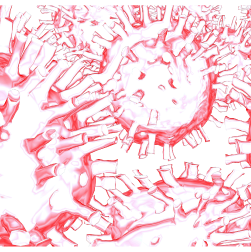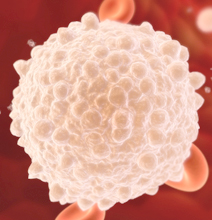Cancer vaccines
The immune system is programmed to defend the body against foreigner invaders causing disease, while being also programmed to not attack our body. This actually limits its ability to fight cancer, because often it does not see malignant cells as a threat.

To make things even harder for patients, some cancers are able to suppress the immune response. Cancer vaccines are an answer to this problem; unlike other cancer therapies, vaccines do not act on the cancer but on the immune system.
They aim to reinforce the response against disease by helping immune cells – such as NK cells – to recognize and destroy the cancer.
This also means that cancer vaccines attack the tumor without the traditional side effects of other treatments – damage to healthy cells.
Cancer vaccines can be produced from:
- Neutralized (so not able to produce disease) extracts/cells from the tumor itself;
- Molecules known to be present in the cancer (antigens);
- Immune cells from the patients capable of triggering a cancer immune response;
- Other strategies
In 2010 the American Food and Drug Administration (FDA) approved the first cancer vaccine – named sipuleucel-T (Provenge®). The vaccine treats prostate cancer by stimulating an immunoresponse against PAP, which is a protein present in the cancer cells of most of prostate cancer patients. Clinical trials have shown that in advanced stage cancer it extends life expectancy for 4 to 20 months, and reduces death by about 20%.
In 2015, the FDA approved talimogene laherparepvec (T-VEC, or Imlygic®), a cancer vaccine where a modified oncolytic virus – a virus that preferentially infects and kills cancer cells – is used to treat patients with metastatic melanomas that cannot be removed surgically. T-VEC is injected into the tumor, infecting and destroying the cancer cells while also triggering an immune response against the cancer.
Even more exciting, recent studies suggest that is possible to develop more effective cancer vaccines by using mutated proteins from the patient’s own tumor. Although several small studies have shown very promising results with this approach, it is too early to know if these vaccines can extend the lives of cancer patients.
Currently, research is focusing in vaccine development for the following cancers:
- Breast cancer;
- Cervical cancer;
- Colorectal cancer;
- Melanoma;
- Lung cancer;
- Lymphoma;
- Prostate cancer;
- Kidney cancer;
- Pancreatic cancer;
- Brain tumors
DNA Vaccines
Another possible vaccine strategy is to inject patients with DNA from cancer cells.
The injection is done so that the cancer DNA inserts itself into the healthy cell’s own DNA. Since DNA is, basically, a set of instructions to produce proteins – more details on this here – the injected cells will start manufacturing cancer proteins together with their own.
The idea is that they will produce enough tumor proteins (or tumor-associated antigen) to stimulate a strong enough immune response to attack the whole tumor. Clinical trials are already in progress on DNA vaccines targeting a variety of cancers, including breast cancer.
A significant advantage of DNA vaccines is that they are well tolerated, killing tumor cells with minimal toxicity, and easy to develop and produce. The problem is that it is challenging to create an effective one.
An exception is mammaglobin-A, a protein produced in high quantities by most breast cancers from early to metastatic - but present in minimal amounts or even absent in normal tissues. Mammaglobin-A is also very good triggering an immune response making it ideal for a vaccine and, in fact, is already in clinical trial for the treatment of breast cancer.





